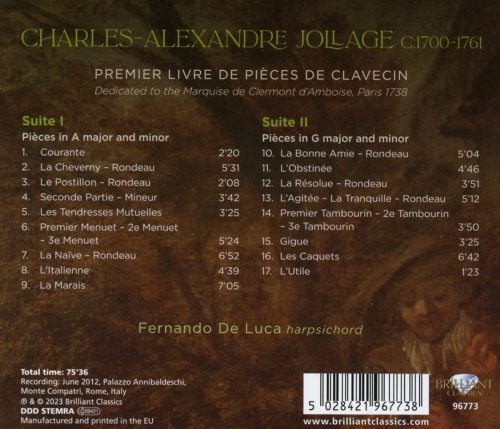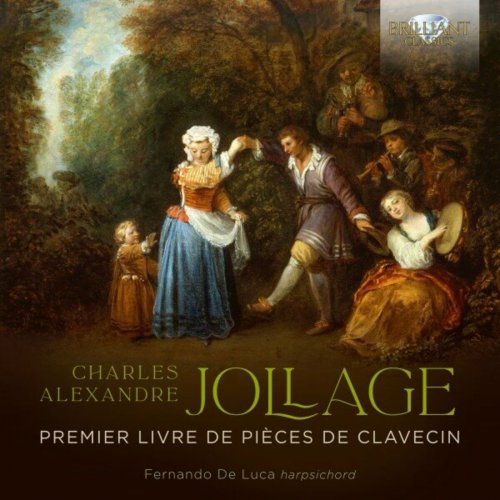
Fernando De Luca - Jollage: Premier livre de Pièces de Clavecin (2023) Hi-Res
BAND/ARTIST: Fernando De Luca
- Title: Jollage: Premier livre de Pièces de Clavecin
- Year Of Release: 2023
- Label: Brilliant Classics
- Genre: Classical
- Quality: FLAC 16/24 Bit (44,1 KHz / tracks+booklet)
- Total Time: 75:27 min
- Total Size: 454 / 825 MB
- WebSite: Album Preview

Tracklist:
01. Pièces in A Major and Minor, Suite I: I. Courante
02. Pièces in A Major and Minor, Suite I: II. La cheverny - Rondeau
03. Pièces in A Major and Minor, Suite I: III. Le postillon - Rondeau
04. Pièces in A Major and Minor, Suite I: IV. Seconde partie - Mineur
05. Pièces in A Major and Minor, Suite I: V. Les tendresses mutuelles
06. Pièces in A Major and Minor, Suite I: VI. Premier menuet - 2e Menuet - 3e Menuet
07. Pièces in A Major and Minor, Suite I: VII. La naïve - Rondeau
08. Pièces in A Major and Minor, Suite I: VIII. L'Italienne
09. Pièces in A Major and Minor, Suite I: IX. La marais
10. Pièces in G Major and Minor, Suite II: I. La bonne amie - Rondeau
11. Pièces in G Major and Minor, Suite II: II. L'Obstinée
12. Pièces in G Major and Minor, Suite II: III. La résolue - Rondeau
13. Pièces in G Major and Minor, Suite II: IV. L'Agitée - La tranquille - Rondeau
14. Pièces in G Major and Minor, Suite II: V. Premier tambourin - 2e Tambourin - 3e Tambourin
15. Pièces in G Major and Minor, Suite II: VI. Gigue
16. Pièces in G Major and Minor, Suite II: VII. Les caquets
17. Pièces in G Major and Minor, Suite II: VIII. L'Utile
A world-premiere recording of elegant, courtly French harpsichord suites by a forgotten name of the early 18th century.
The early life and formation of Charles-Alexandre Jollage is shrouded in obscurity. By the time he enters the historical record in the 1720s, he had become organist for the King of Poland, Stanislas Leszcznski, at that time exiled to France and settled at the castle of Chambord in the Loire region of France.
In 1733 Stanislas left Chambord for Warsaw where he claimed the throne of Poland; meanwhile Jollage seems to have settled in Paris, where his only known set of work was published in 1738, and dedicated to the Marquise of Clermont d’Amboise. After that point, it has been established with greater certainty that he remained in Paris as an organist, and died there in 1761.
This ‘First Book’ of Jollage’s harpsichord works was never followed by a second, but the two suites therein have rewarded the investigation of Fernando De Luca, who has already revived the little-known harpsichord music of Christoph Graupner (96131) and Christophe Moyreau (96285) for Brilliant Classics. Jollage’s refined and elegant idiom reflects the predominant taste in France during the first half of the 18th century, enlivened throughout with touches of originality. Take, for example, the penultimate piece of the First Suite: L’italienne, which is written in an entirely contemporary style perhaps emulating Domenico Scarlatti and even resembling the sonatas of Haydn.
In his booklet essay, Fernando De Luca makes a pertinent comparison between Jollage and the contemporary master Watteau. ‘By combining dance, music and painting, while suspending time and movement, Watteau captures a snapshot of human life… He combines lightness and tragedy to capture a fleeting moment. Jollage draws his creative lifeblood from the same source, while retaining all the characteristics of harpsichord music of his period.’
‘A monumental enterprise… Listeners will want to dip in and out, perhaps taking one partita at a time, admiring both Graupner’s and De Luca’s facility and being rewarded with some attractive music confidently delivered.’ Early Music Review February 2022 (Graupner)
The early life and formation of Charles-Alexandre Jollage is shrouded in obscurity. By the time he enters the historical record in the 1720s, he had become organist for the King of Poland, Stanislas Leszcznski, at that time exiled to France and settled at the castle of Chambord in the Loire region of France.
In 1733 Stanislas left Chambord for Warsaw where he claimed the throne of Poland; meanwhile Jollage seems to have settled in Paris, where his only known set of work was published in 1738, and dedicated to the Marquise of Clermont d’Amboise. After that point, it has been established with greater certainty that he remained in Paris as an organist, and died there in 1761.
This ‘First Book’ of Jollage’s harpsichord works was never followed by a second, but the two suites therein have rewarded the investigation of Fernando De Luca, who has already revived the little-known harpsichord music of Christoph Graupner (96131) and Christophe Moyreau (96285) for Brilliant Classics. Jollage’s refined and elegant idiom reflects the predominant taste in France during the first half of the 18th century, enlivened throughout with touches of originality. Take, for example, the penultimate piece of the First Suite: L’italienne, which is written in an entirely contemporary style perhaps emulating Domenico Scarlatti and even resembling the sonatas of Haydn.
In his booklet essay, Fernando De Luca makes a pertinent comparison between Jollage and the contemporary master Watteau. ‘By combining dance, music and painting, while suspending time and movement, Watteau captures a snapshot of human life… He combines lightness and tragedy to capture a fleeting moment. Jollage draws his creative lifeblood from the same source, while retaining all the characteristics of harpsichord music of his period.’
‘A monumental enterprise… Listeners will want to dip in and out, perhaps taking one partita at a time, admiring both Graupner’s and De Luca’s facility and being rewarded with some attractive music confidently delivered.’ Early Music Review February 2022 (Graupner)
Year 2023 | Classical | FLAC / APE | HD & Vinyl
As a ISRA.CLOUD's PREMIUM member you will have the following benefits:
- Unlimited high speed downloads
- Download directly without waiting time
- Unlimited parallel downloads
- Support for download accelerators
- No advertising
- Resume broken downloads


